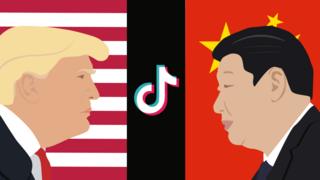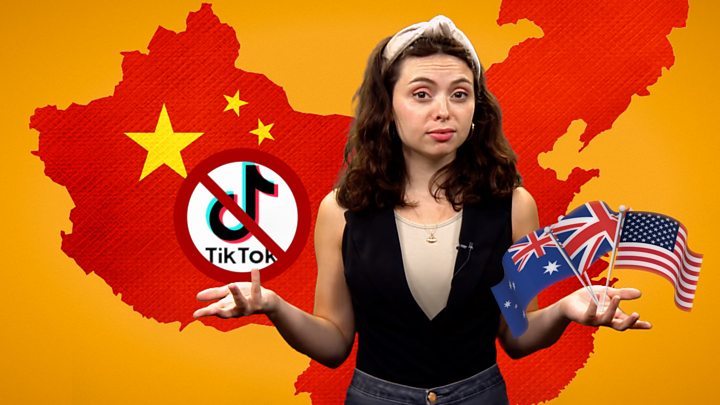
With its eclectic mix of viral dance crazes and lip-sync comedy sketches, TikTok has become a phenomenon among young people.
But with strong links to China, it’s the latest company to come under attack as tensions between President Xi’s China and President Trump’s US rise.
The US and Australia are considering banning the app and India has already taken it off app stores.
What is TikTok?
TikTok is a free app like a short-form version of YouTube. Users can post videos up to one minute long and choose from a huge database of songs and filters.
Comedy clips and movie quotes are also on offer for users to lip-sync to.

Media playback is unsupported on your device
Once a user gets more than 1,000 followers, they can also broadcast live to their fans and accept digital gifts which can be exchanged for money.
The app displays both videos by people a user follows and, more prominently, content that the app chooses based on what they have watched before.
Private messaging is also available between users.
How big is it?
Since early 2019 the app has regularly appeared near the top of download charts.
The pandemic lockdowns have also been credited with sparking a surge in interest, propelling Tiktok and its sister app Douyin – which is available in mainland China – to an estimated two billion downloads worldwide, with about 800 million active users.
Top 10 countries for TikTok downloads
Millions of downloads
The app has been downloaded by far the most often in India, but Delhi’s ban means China is currently its top market, followed by the United States.
What are TikTok’s China links?
TikTok started life as three different apps.
The first was a US app called Musical.ly, which launched in 2014. In 2016, Chinese tech giant Bytedance launched a similar service in China called Douyin.
ByteDance expanded globally under a different name – TikTok.
In 2018 Bytedance purchased Musical.ly and folded it into its TikTok operation.
ByteDance has attempted to distance its app from its Chinese ownership, appointing former senior Disney executive Kevin Mayer as chief executive of TikTok.
How much data does TikTok collect?
TikTok collects a huge amount of data on its users including:
- what videos are watched and commented upon
- location data
- phone model and operating system used
- the keystroke rhythms people exhibit when they type.
Some of the app’s data collection has raised eyebrows, including the recent revelation that it was regularly reading the copy-and-paste clipboards of users.
But this was also found to be the case for dozens of other apps including Reddit, LinkedIn, the New York Times and the BBC News app, and it does not appear that anything nefarious was going on.
Much of TikTok’s general collection is comparable to other data-hungry social networks such as Facebook. However, the UK’s Information Commissioner’s Office – a privacy watchdog – is currently investigating the app.
Could China use TikTok to spy on people?
US Secretary of State Mike Pompeo has alleged that TikTok users are at risk of their data ending up “in the hands of the Chinese Communist Party”.
TikTok has repeatedly insisted that data is collected and stored outside China.
“The suggestion that we are in any way under the thumb of the Chinese government is completely and utterly false,” Theo Bertram, TikTok’s head of public policy for Europe, the Middle East and Africa, told the BBC.
However, like with Huawei, the arguments against TikTok seem to be based around the theoretical possibility of the Chinese government compelling ByteDance under local laws to hand over data on foreign users.
The 2017 National Security Law in China compels any organisation or citizen to “support, assist and co-operate with the state intelligence work” in accordance with the law.
Mr Bertram said that if TikTok was approached by the Chinese government, “we would definitely say no to any request for data”.
But ByteDance will be mindful about the consequences of displeasing the Communist Party.
A news app called Toutiao was taken offline for 24 hours in 2017, according to the South China Morning Post, after the Beijing Internet Information Office said it had been spreading “pornographic and vulgar content”.
Refusing a direct order from the country’s spymasters could also have consequences for the wider company and its leadership.
Could TikTok be used for Chinese propaganda?
Another concern is censorship.
China has one of the most restricted internet spaces in the world, with its infamous Great Firewall blocking parts of the web for its citizens.
Last year, the Guardian reported that TikTok’s staff and automated systems had enforced moderation rules that censored material deemed to be politically sensitive. Footage of Tiananmen Square protests and Tibetan independence demands were among the material said to have be banned or restricted.
Further reporting from the Washington Post, which talked to six former TikTok employees, said moderators in China had the final say on whether flagged videos were approved.
ByteDance said the guidelines referred to had since been phased out.
But some argue that its moderation culture may still be biased in favour of the Chinese state.

Recent Comments